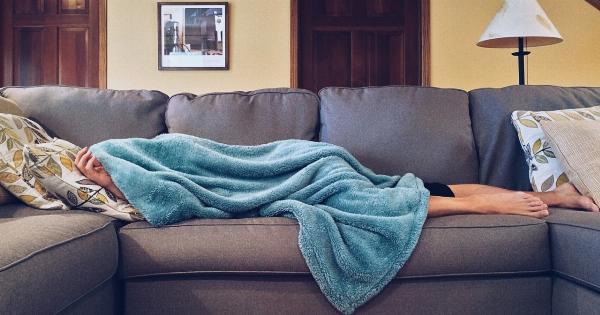Many people enjoy the occasional nap or movie night on the couch, but did you know that sleeping on the couch can actually be detrimental to your health? While it may seem comfortable and convenient at times, there are several reasons why sleeping on the couch should be avoided. In this article, we will explore three of these reasons and offer some tips for creating a healthier sleep environment.
1. Poor Posture
One of the main reasons why sleeping on the couch is bad for your health is the impact it has on your posture. Couches are typically designed for sitting, not sleeping, and therefore lack the necessary support for your spine and neck.
When you sleep on a couch, you often end up in awkward positions that can strain your back, neck, and shoulders. Over time, this can lead to chronic pain and musculoskeletal issues.
2. Disrupted Sleep
Sleeping on the couch can also negatively affect the quality of your sleep. Couches are usually placed in common areas of the house, such as the living room, where there may be more noise and distractions.
These factors can interrupt your sleep and prevent you from entering deep, restorative sleep cycles. Additionally, couches are often not as comfortable as a proper mattress, leading to tossing and turning throughout the night.
3. Allergen Accumulation
Another hidden danger of sleeping on the couch is the accumulation of allergens. Couches tend to harbor dust, pet dander, and other allergens that can trigger allergic reactions or respiratory issues.
If you have allergies or asthma, sleeping on the couch can exacerbate your symptoms and make it harder for you to breathe while you sleep. It’s important to regularly clean and vacuum your couch to minimize allergen build-up.
Tips for a Healthier Sleep Environment
Now that you understand some of the reasons why sleeping on the couch is bad for your health, let’s discuss a few tips for creating a healthier sleep environment:.
1. Invest in a Good Mattress
One of the best ways to improve your sleep quality is by investing in a good mattress. Look for a mattress that provides adequate support for your body and aligns your spine correctly.
There are various types of mattresses available, such as memory foam, latex, and innerspring, so choose one that suits your preferences and sleep needs.
2. Create a Dark and Quiet Bedroom
To optimize your sleep, it’s important to create a dark and quiet bedroom environment. Use blackout curtains or blinds to block out external light sources, and consider using earplugs or a white noise machine to mask any unwanted sounds.
A peaceful sleep environment can significantly improve your overall sleep quality and help you wake up feeling refreshed.
3. Establish a Bedtime Routine
Creating a consistent bedtime routine can signal to your body that it’s time to wind down and prepare for sleep. Avoid stimulating activities, such as using electronic devices or watching TV, before bed.
Instead, engage in relaxing activities like reading a book, taking a warm bath, or practicing meditation. A bedtime routine can help you relax and transition into a restful night’s sleep.
4. Keep Your Bedroom Clean
Regularly cleaning your bedroom, including your mattress, sheets, and pillows, can minimize the accumulation of allergens and create a healthier sleeping environment.
Wash your sheets and pillowcases weekly, vacuum your mattress to remove dust, and consider using allergen-proof covers to protect against dust mites.
5. Avoid Caffeine and Heavy Meals
Consuming caffeine or eating heavy meals close to bedtime can interfere with your ability to fall asleep and stay asleep.
Avoid drinking coffee, tea, or other caffeinated beverages in the evening, and try to have your dinner at least a few hours before bedtime. Opt for lighter, nourishing snacks if you feel hungry before bed.
Conclusion
While sleeping on the couch may be tempting at times, it’s important to prioritize your health and well-being by creating a proper sleep environment.
The poor posture, disrupted sleep, and allergen accumulation associated with couch sleeping can have long-term negative effects on your health. By investing in a good mattress, creating a dark and quiet bedroom, establishing a bedtime routine, keeping your bedroom clean, and avoiding caffeine and heavy meals, you can significantly improve your sleep quality and overall health.






























